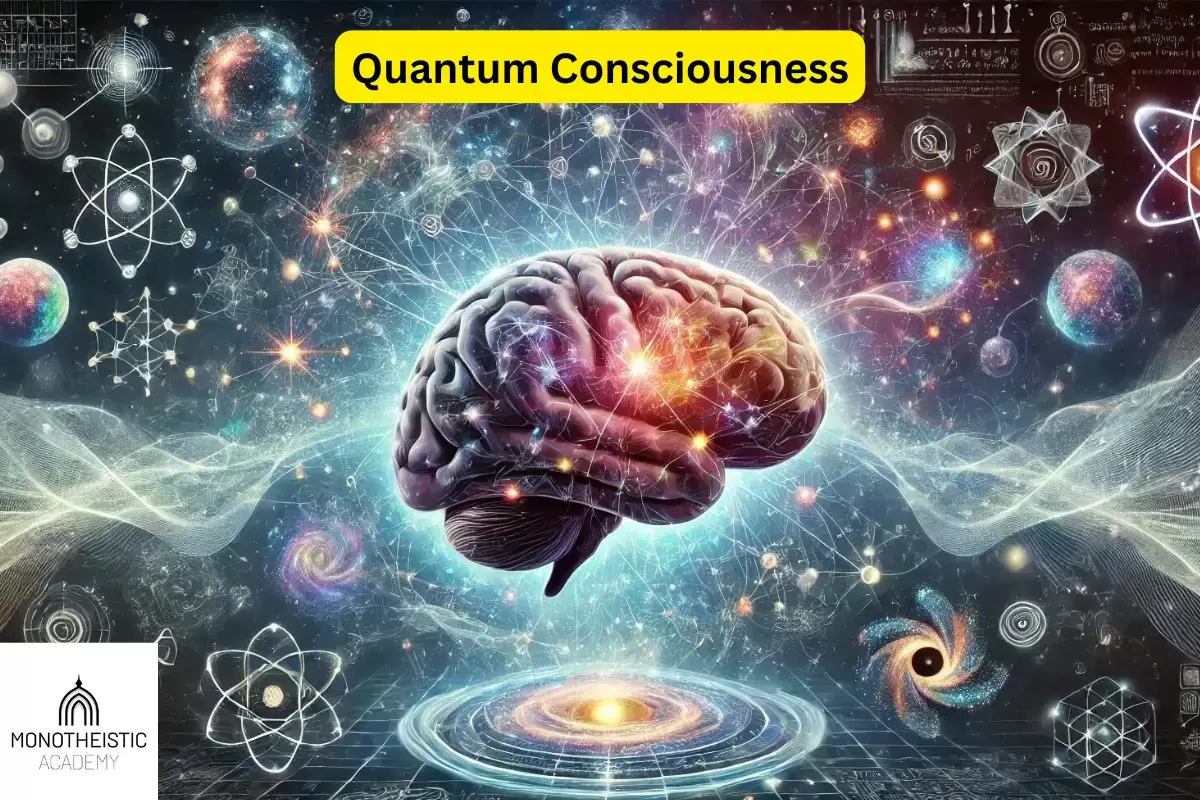
Quantum Consciousness: Bridging the best Gap Between Science and the Mysteries of the Mind
Contents
Quantum Consciousness refers to the idea that consciousness may not arise solely from classical, biological processes within the brain but instead could be influenced or governed by quantum mechanics. It integrates quantum phenomena such as superposition (the ability of particles to exist in multiple states at once) and entanglement (the connection between particles, regardless of distance) into the study of consciousness. This concept posits that, at the fundamental level, the brain operates with quantum processes, which could explain the complex nature of human awareness, decision-making, and subjective experience.
Key Concepts:
- Quantum mechanics in the brain: The hypothesis that quantum effects, typically observed in subatomic particles, play a role in brain functions.
- Non-classical processes: Consciousness may not be entirely reducible to classical neural activity and requires quantum explanations to bridge the gap in understanding.
Historical Context and Emergence
The idea of Quantum Consciousness emerged in the late 20th century, drawing on earlier quantum mechanics theories that dealt with the fundamental nature of reality. The theory gained momentum from the Penrose-Hameroff Orch-OR Model in the 1990s. Before that, physicists like Eugene Wigner speculated on the role of consciousness in quantum mechanics, particularly regarding the collapse of the wave function. These ideas challenged classical interpretations of the brain and mind by introducing the notion that quantum phenomena could be essential for understanding how consciousness arises.
Relevance to Neuroscience and Philosophy
Quantum Consciousness is significant to both neuroscience and philosophy, as it offers a novel approach to the “hard problem” of consciousness—explaining how subjective experiences arise from physical processes. In neuroscience, the theory challenges traditional models that rely solely on neural firing patterns, introducing quantum effects that could account for phenomena like the binding problem (how different perceptions combine into a unified experience).
In philosophy, Quantum Consciousness raises questions about free will, the nature of reality, and whether the mind can exist independently of the brain. Philosophers like David Chalmers have engaged with these ideas, often debating whether quantum mechanics could truly resolve issues of dualism or materialism. This interdisciplinary blend allows researchers to explore consciousness beyond the limitations of classical physics, suggesting that human awareness may be tied to the most fundamental aspects of the universe.
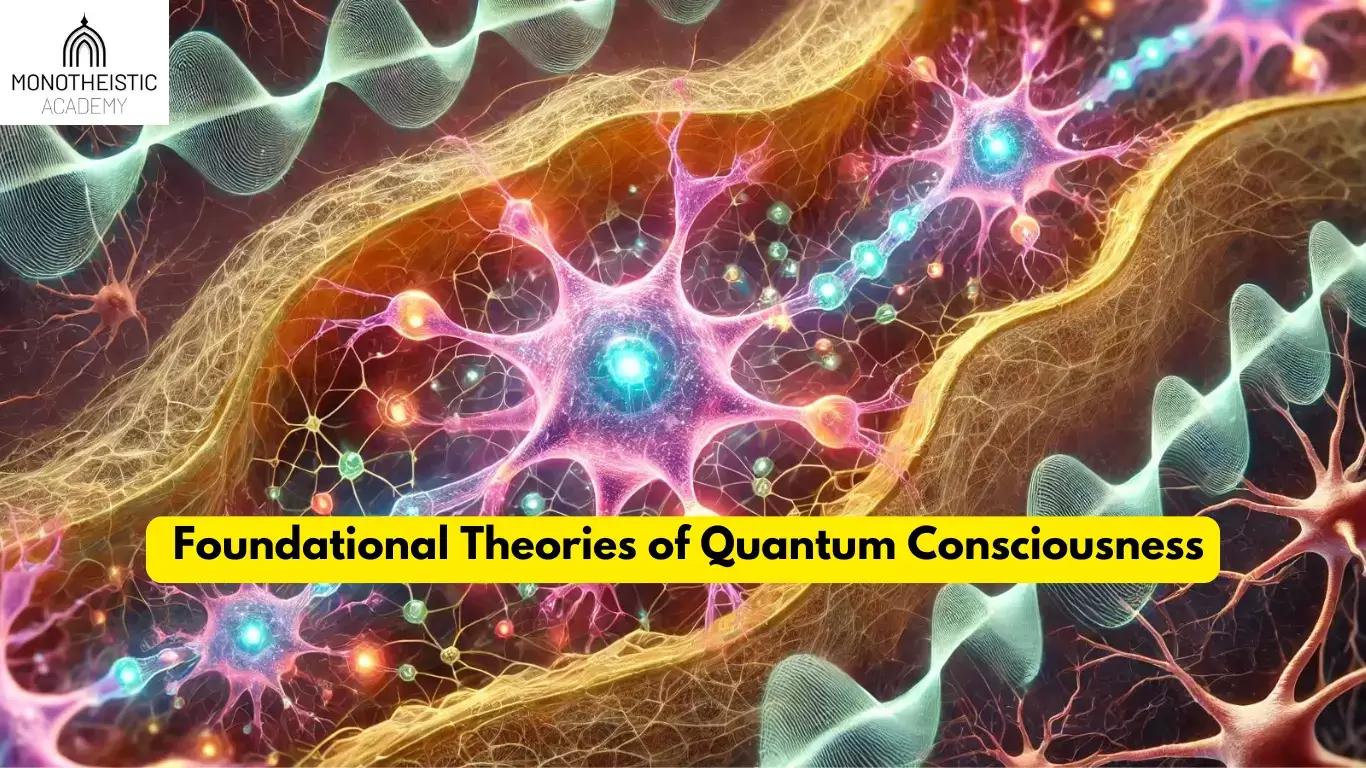
Foundational Theories of Quantum Consciousness
Quantum consciousness is an emerging field that seeks to explain the enigmatic nature of consciousness through the principles of quantum mechanics. While traditional neuroscience attributes consciousness to classical processes like neuron activity and synaptic connections, some scientists believe that phenomena like quantum entanglement, superposition, and coherence may provide deeper insights into how consciousness arises. Below, we explore three key theories at the intersection of quantum mechanics and the mind.
The Penrose-Hameroff Orch-OR Model
One of the most prominent theories linking quantum mechanics with consciousness is the Orchestrated Objective Reduction (Orch-OR) model, proposed by physicist Sir Roger Penrose and anesthesiologist Stuart Hameroff. According to this theory, consciousness is not merely a byproduct of neural computation but is fundamentally rooted in quantum processes occurring within the brain’s microtubules. These microtubules, which are components of the cytoskeleton in neurons, may serve as quantum processing units.
The Orch-OR model suggests that quantum coherence—where particles are in multiple states at once—occurs inside these microtubules, allowing them to act like quantum computers. Penrose and Hameroff argue that quantum superposition in these structures enables complex, non-classical processing, which is then “reduced” or collapsed in a process they call objective reduction. This quantum state reduction is orchestrated by biological factors, leading to moments of conscious experience.
In essence, this theory proposes that consciousness emerges from the collapse of quantum superpositions within the brain, linking quantum physics directly to subjective awareness.
The brain’s ability to orchestrate this collapse is seen as central to creativity, decision-making, and self-awareness, suggesting that the mind operates on both quantum and classical levels.
The Role of Quantum Entanglement in Brain Activity
Another compelling idea within quantum consciousness theories is the role of quantum entanglement in brain function. Quantum entanglement occurs when two or more particles become linked in such a way that the state of one instantly affects the state of the other, regardless of the distance between them.
This phenomenon challenges our classical understanding of locality and causality.
Some researchers speculate that quantum entanglement might enable different regions of the brain to communicate instantly and synchronously, without the time delays imposed by classical neural pathways. For example, sensory inputs, memory, and cognition could be entangled, allowing for the rapid and unified processing that underlies conscious experience.
This could provide an explanation for the brain’s extraordinary ability to integrate vast amounts of information in a fraction of a second, resulting in a seamless flow of thoughts, emotions, and perceptions.
In this framework, quantum entanglement might explain not only how the brain achieves global synchronization of neural activity but also mysterious phenomena like intuition or even telepathy.
While these ideas remain speculative, they highlight the potential of quantum mechanics to revolutionize our understanding of the brain’s interconnectedness.
Superposition and Quantum Coherence in Neurons
At the core of quantum mechanics lies the principle of superposition, where particles exist in multiple states simultaneously until measured.
Applied to consciousness, this idea suggests that neurons or groups of neurons could exist in superposed states—both firing and not firing at the same time.
This would allow for far more complex and dynamic brain processes than classical neural models can explain.
Moreover, the phenomenon of quantum coherence, which allows multiple quantum states to maintain superposition over time, could enable neurons to remain in these states for longer periods, enhancing the brain’s ability to process information.
If neurons or neuronal networks could operate in this superposed, coherent state, it might explain how the brain performs tasks like parallel processing and rapid decision-making.
One challenge to this idea, however, is the brain’s “warm, wet” environment, which is generally considered inhospitable to quantum coherence. Quantum systems typically require extreme isolation and low temperatures to maintain coherence.
Yet, some scientists suggest that biological systems like the brain may have evolved mechanisms to preserve coherence, even in such conditions. If true, this would imply that the brain is operating at a quantum level far more than we currently understand.
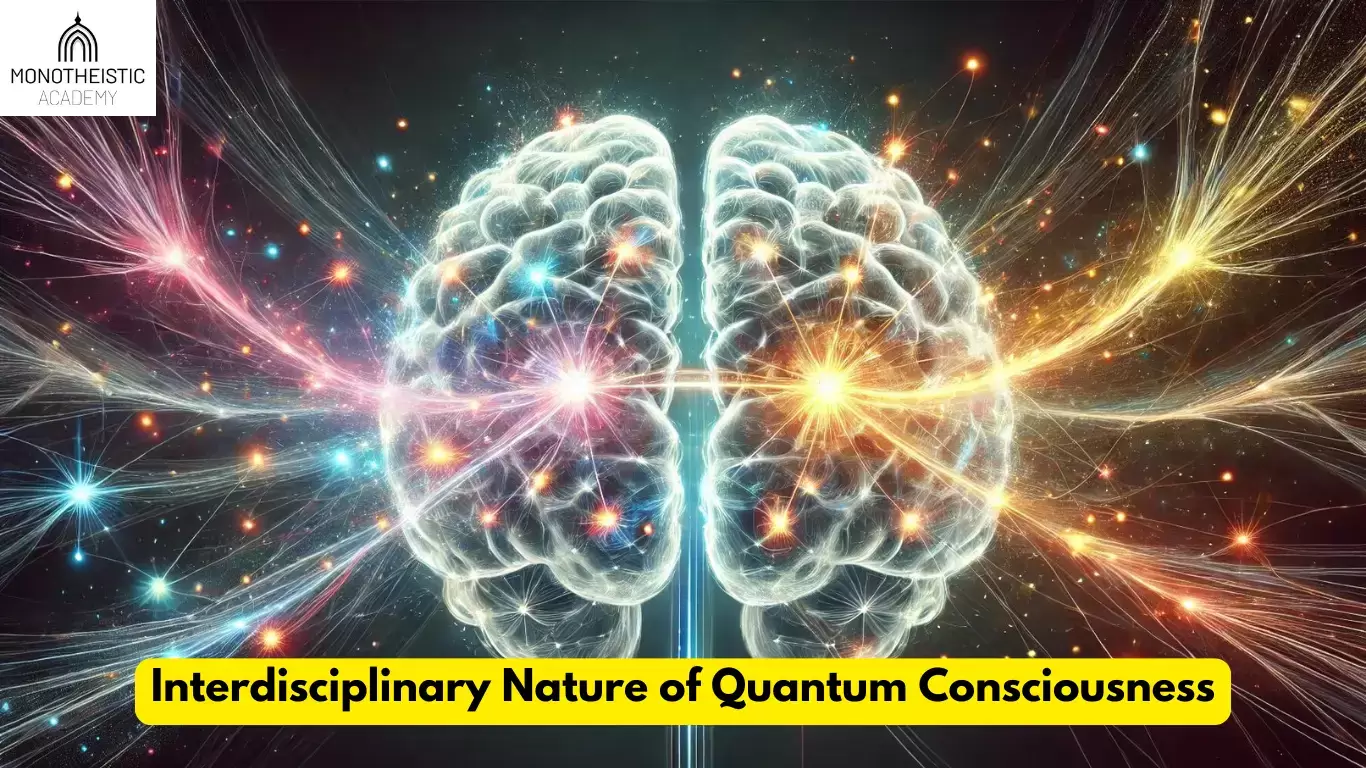
Interdisciplinary Nature of Quantum Consciousness
The study of quantum consciousness is not confined to a single discipline but spans across quantum physics, neuroscience, philosophy, and information theory, leading to unique perspectives on how the mind works. Below, we explore how these fields converge and what new insights they bring to the study of consciousness.
Quantum Physics Meets Neuroscience
At the heart of quantum consciousness theories is the intersection of quantum physics and neuroscience. Quantum mechanics, the study of the subatomic world where particles exhibit wave-particle duality, superposition, and entanglement, has led researchers to question whether such phenomena could be harnessed by the brain to create conscious awareness.
In neuroscience, consciousness is traditionally explained through neural activities like synaptic transmission and electrochemical processes.
However, proponents of quantum consciousness argue that classical models may not fully account for the complexity and integration seen in human cognition.
The potential for quantum coherence and superposition in neurons could explain how the brain processes vast amounts of information at once, solving problems like parallel processing and memory integration.
If quantum effects can be sustained in the “warm, wet” environment of the brain, this could reshape our understanding of mental function at a fundamental level.
This interdisciplinary fusion forces scientists to rethink conventional models of brain activity, suggesting that neural networks may operate on both quantum and classical levels.
Advances in quantum biology and quantum computing also continue to challenge the boundaries of how we conceptualize the brain’s structure and function, possibly leading to more sophisticated models of consciousness.
Philosophical Implications of Quantum Mind Theories
Quantum consciousness also raises deep philosophical questions about the nature of the mind and reality itself. Traditionally, consciousness has been a topic of philosophy of mind, where questions of subjective experience (the “hard problem of consciousness”) and the relationship between mind and matter have puzzled thinkers for centuries.
Quantum mind theories introduce new ways of addressing these questions.
If consciousness is tied to quantum mechanics, it implies that subjective experience may be connected to the fundamental laws of physics.
This leads to the radical suggestion that consciousness is not an emergent property of matter but rather a fundamental aspect of reality, as seen in panpsychism, which posits that consciousness is a basic feature of all matter.
Moreover, the Orch-OR model and similar theories suggest that quantum collapses are connected to conscious experience, leading to debates on whether the observer effect in quantum physics plays a role in shaping reality itself.
This opens up further philosophical inquiries: Does consciousness actively participate in shaping the physical world, as quantum measurement suggests? Are free will and determinism reconcilable if consciousness is tied to quantum indeterminacy?
These questions challenge classical views of the mind and offer a new lens through which to explore the relationship between consciousness and the universe.
Cognitive Insights from Quantum Information Theory
Quantum information theory provides another lens through which to examine consciousness, particularly by offering novel explanations of cognition.
While classical information theory deals with bits, quantum information theory works with qubits, which can exist in superpositions of states. This means that quantum systems can process and store exponentially more information than classical systems.
In the context of the brain, quantum information processing might explain how the mind manages tasks like decision-making, memory storage, and parallel processing with remarkable efficiency.
For example, superposition could allow neurons to be in multiple states at once, enhancing the brain’s ability to store and retrieve information rapidly. Quantum entanglement could allow different brain regions to share information without the time lags associated with classical signaling.
The interdisciplinary connection between cognitive science and quantum information theory also suggests that certain mental processes, like creativity or intuition, might be enhanced through quantum mechanisms.
The brain could use quantum algorithms to process complex data sets or solve problems in ways that classical neural networks cannot.
Additionally, this raises the exciting possibility that artificial intelligence could one day harness quantum computing to mimic human consciousness, leading to new breakthroughs in quantum cognitive science.
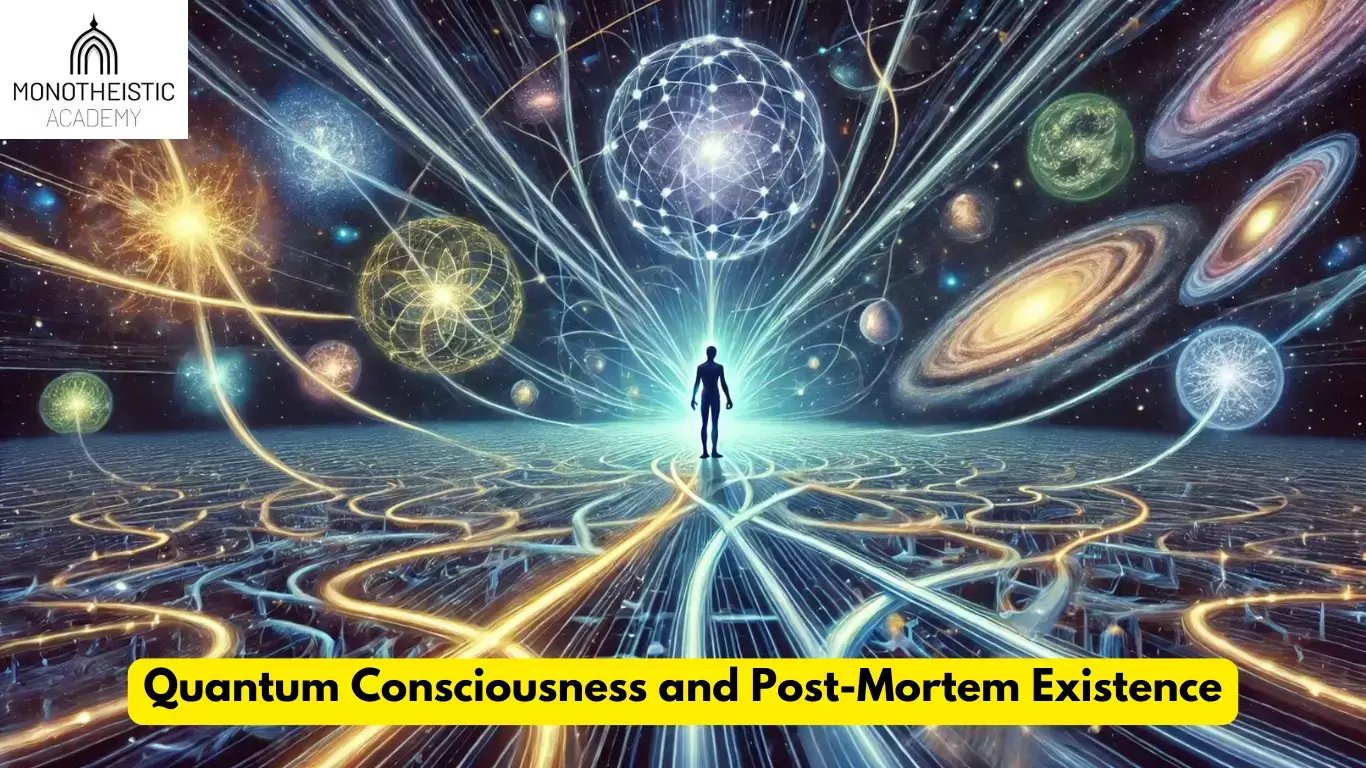
Quantum Consciousness and Post-Mortem Existence
The nature of consciousness and its fate after death has long fascinated philosophers, scientists, and spiritual thinkers alike. Quantum consciousness theories offer speculative insights into whether consciousness might survive the physical body, drawing on concepts from quantum mechanics to challenge conventional views of life and death.
Theories of Consciousness Beyond Death
One theory in quantum consciousness posits that consciousness may not be confined to the brain but instead exists as a non-local phenomenon, meaning it could extend beyond the physical body. This idea is often tied to the hypothesis that consciousness is not a product of neuronal activity but rather an intrinsic part of the quantum fabric of the universe. If true, this raises the possibility that the conscious self could persist even after the physical body ceases to function.
Some proponents of this view draw on quantum entanglement to suggest that consciousness could continue in a non-material form. In this scenario, consciousness could become “entangled” with the universe, perhaps retaining coherence even after the death of the body.
This view is not far removed from certain spiritual or religious beliefs that posit the existence of an eternal soul or life force.
The idea that the conscious mind is fundamentally tied to quantum processes opens up the possibility of post-mortem existence that goes beyond purely biological explanations.
Supporters of these ideas often point to phenomena like near-death experiences (NDEs) or reports of consciousness persisting during clinical death.
While such experiences are often dismissed by traditional science as hallucinatory or psychological phenomena, quantum theories of consciousness provide a potential framework for understanding how the mind might operate outside the constraints of the physical body, and how it could transcend death.
Quantum Immortality and Its Philosophical Implications
Another fascinating concept connected to quantum consciousness and death is the idea of quantum immortality, which emerges from the many-worlds interpretation of quantum mechanics. According to the many-worlds theory, every quantum event spawns a branching universe in which each possible outcome of the event is realized.
In the context of consciousness and death, this suggests that in one branch of reality, you may experience death, while in another, you continue to live, unaware that other versions of “you” have died.
The theory of quantum immortality speculates that from the first-person perspective, your consciousness would only ever experience timelines where you survive—potentially indefinitely.
Each time a life-or-death event occurs, your consciousness would continue in the branch of reality where you avoid death. This notion challenges our understanding of mortality and suggests that, in a sense, individuals might live forever, at least from their subjective point of view, in an infinite series of branching universes.
Philosophically, quantum immortality raises profound questions about the nature of identity, survival, and what it means to be conscious.
If consciousness continues in a branching multiverse, are we truly immortal? Would this be an endless continuation of self-awareness, or a fragmented existence spread across multiple realities?
Quantum immortality also has existential implications: if death is never experienced directly, how does this shape our understanding of life, meaning, and the nature of existence itself?
Critics of quantum immortality point out that it remains purely speculative and is difficult, if not impossible, to verify empirically.
Additionally, it raises questions about personal identity—if “you” continue in a different branch of reality, is that still “you”? How do we define the continuity of the self across divergent realities?
These questions challenge not only physics but also longstanding philosophical debates about the self, the soul, and the afterlife.
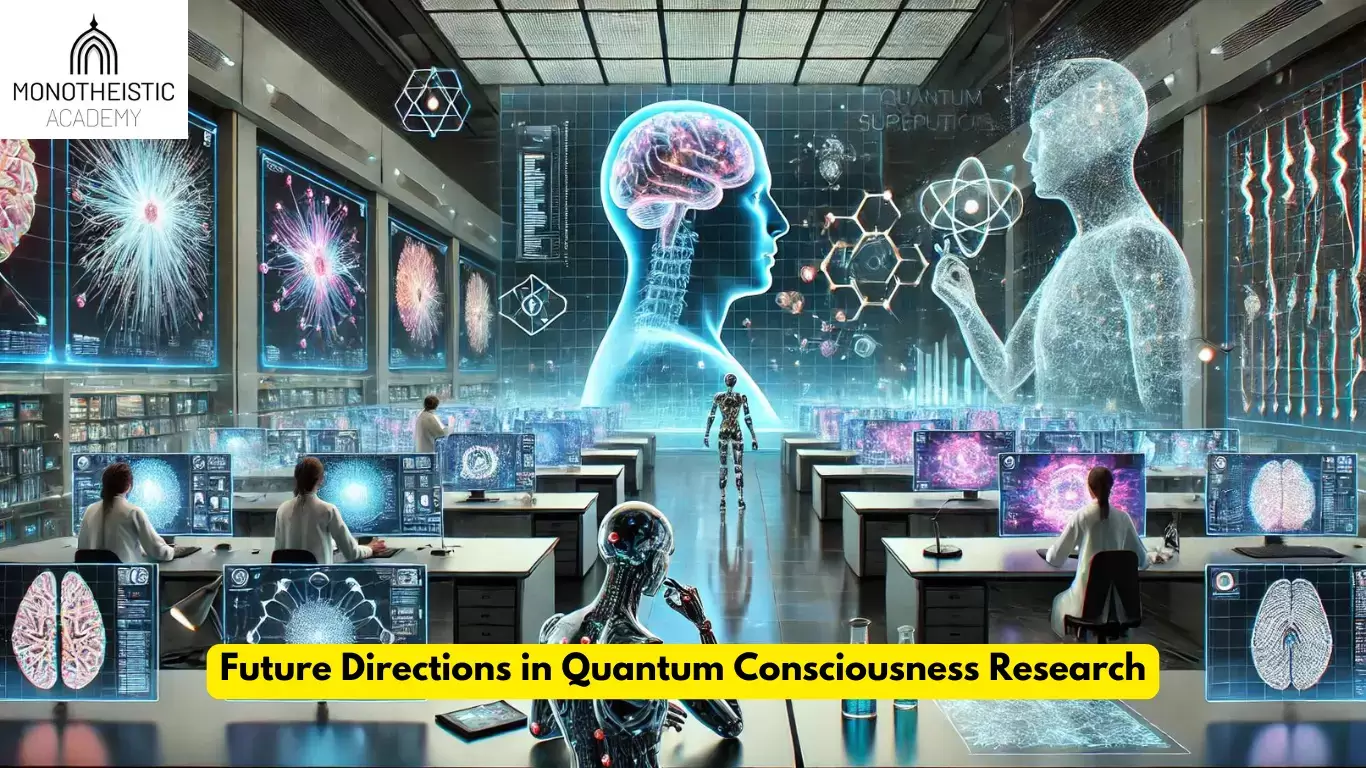
Future Directions in Quantum Consciousness Research
As the field of quantum consciousness evolves, future research will likely be driven by advancements in technology and interdisciplinary collaboration. Three key areas show particular promise for moving the field forward.
Advances in Neuroimaging and Quantum Computing
To better understand the potential quantum processes in the brain, researchers are looking toward breakthroughs in neuroimaging and quantum computing.
Current brain imaging technologies, such as fMRI and EEG, can’t detect activity at the quantum level. However, future innovations—like quantum sensors and nanotechnology—may allow scientists to observe quantum phenomena, such as superposition and coherence within neurons.
This could provide concrete evidence supporting the role of quantum mechanics in consciousness.
At the same time, quantum computing offers the potential to simulate brain functions in ways that traditional computers cannot.
These computers, which rely on qubits capable of existing in multiple states simultaneously, could model the brain’s quantum processes more accurately, helping researchers to explore how quantum mechanics might influence thought, perception, and decision-making.
The Role of Artificial Intelligence in Quantum Consciousness
Artificial intelligence (AI) could also play a critical role in quantum consciousness research.
AI algorithms can process massive amounts of data, making it easier to explore complex, quantum-level phenomena within the brain. Additionally, advances in quantum AI—artificial intelligence powered by quantum computers—may offer insights into how quantum mechanics could give rise to consciousness. By simulating quantum brain functions, AI could help test and refine quantum consciousness theories, pushing the boundaries of our understanding of both AI and human cognition.
Furthermore, quantum AI systems themselves may one day become conscious.
If the quantum nature of consciousness is proven, it could be possible to design AI that mirrors human consciousness by utilizing quantum principles like superposition and entanglement, leading to groundbreaking developments in both cognitive science and machine consciousness.
Ethical and Philosophical Questions for Future Research
As quantum consciousness research progresses, it will raise important ethical and philosophical questions.
For example, if quantum processes are shown to be integral to consciousness, how does this impact our understanding of human identity, free will, and life after death?
Additionally, the potential for conscious AI or new forms of life based on quantum principles would challenge existing moral frameworks. Researchers will need to grapple with questions about the rights and treatment of quantum-conscious entities and the ethical implications of creating machines that might experience consciousness.
Moreover, if quantum consciousness theories suggest that consciousness is more fundamental to the universe than previously thought, this could alter perspectives on the nature of reality itself, blurring the line between materialism and dualism.
These profound questions will require input from ethicists, philosophers, and scientists as the field evolves.


